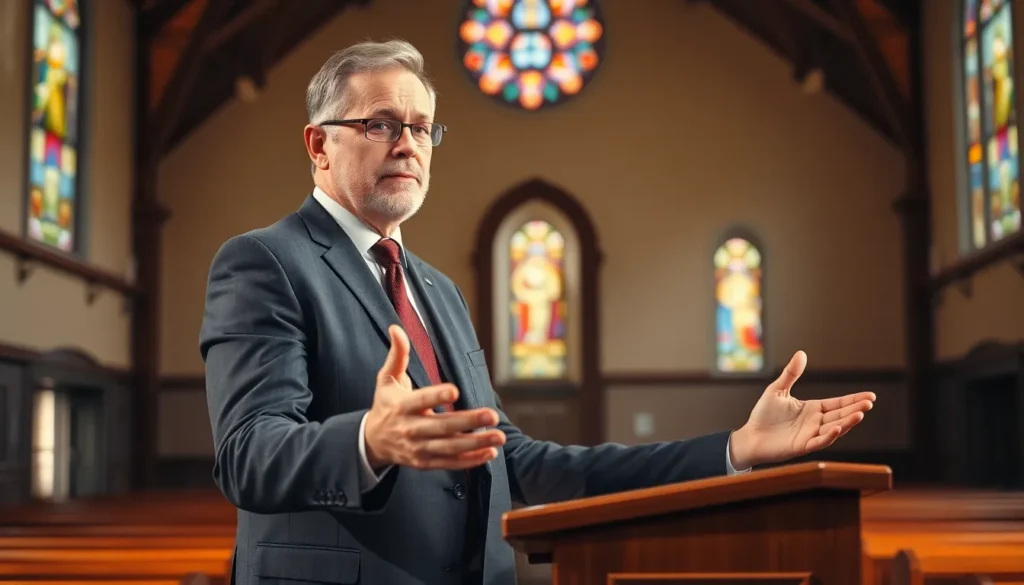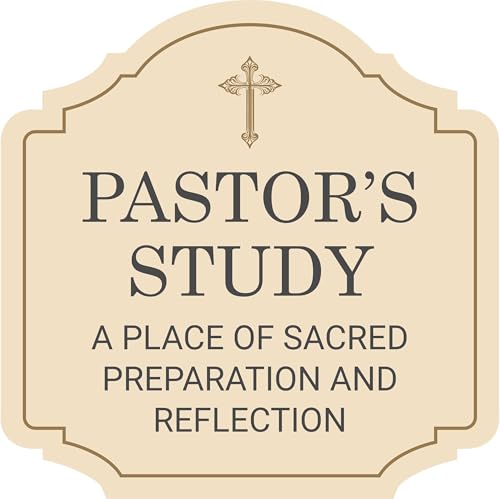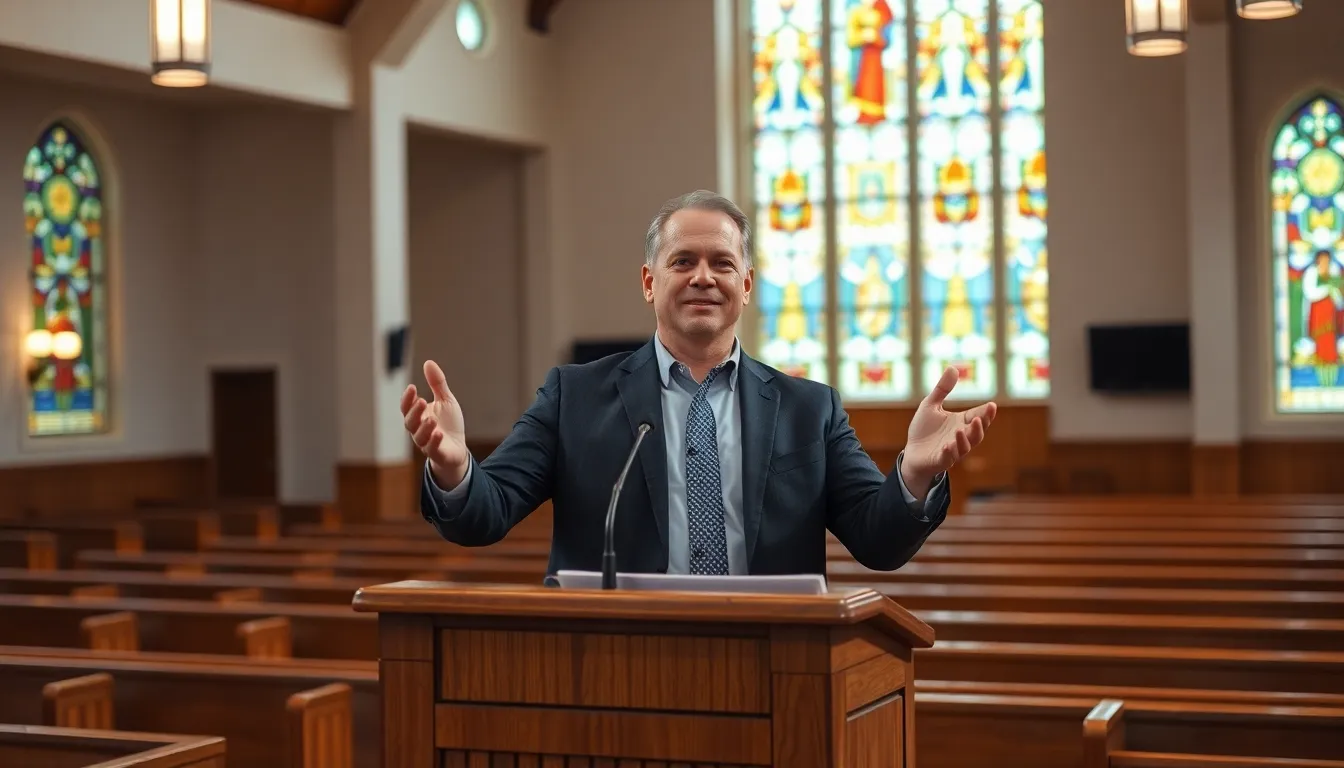We’ve all witnessed it – that uncomfortable moment when a spiritual leader’s behavior makes us question their humility and motives. Unfortunately arrogant pastors exist in churches across the industry and their toxic leadership can devastate entire congregations.
Recognizing the warning signs of pastoral arrogance isn’t always easy especially when we’re taught to respect religious authority. But identifying these red flags early can protect our spiritual wellbeing and help us make informed decisions about our church community.
From dismissing constructive feedback to demanding unquestioning loyalty pastoral arrogance manifests in subtle and obvious ways. We’ll explore the most common behaviors that signal when a pastor has lost sight of their calling to serve humbly and how these patterns impact both individual believers and entire church communities.
What Makes a Pastor Arrogant?
Pastoral arrogance develops when spiritual leaders lose sight of their servant calling and begin prioritizing personal status over congregational care. Multiple factors contribute to this transformation from humble shepherd to self-serving authority figure.
Power Without Accountability creates the primary breeding ground for arrogant behavior in pastoral leadership. Churches that lack proper oversight structures enable pastors to operate without meaningful checks on their authority. Board members who rubber-stamp decisions without question foster environments where pastoral pride can flourish unchecked.
Excessive Praise and Adoration from congregation members feeds the ego of susceptible pastors. Constant compliments about preaching ability and leadership skills can inflate a pastor’s sense of self-importance. Members who treat their pastor as infallible or above criticism contribute to the development of narcissistic tendencies.
Educational Pride manifests when pastors become overly focused on their theological degrees and academic achievements. Seminaries that emphasize intellectual superiority over spiritual humility can produce graduates who view themselves as more enlightened than their congregations. This academic arrogance creates distance between pastor and people.
Financial Success and Church Growth can corrupt pastoral motives when numbers become more important than spiritual health. Pastors who measure their worth by attendance figures and offering amounts often develop superiority complexes. Large churches with substantial budgets can make pastors feel like corporate executives rather than spiritual servants.
Isolation From Real Relationships occurs when pastors surround themselves only with people who agree with them. Staff members who fear losing their jobs rarely challenge problematic pastoral behavior. This echo chamber effect reinforces arrogant attitudes and prevents necessary correction.
Comparison With Other Pastors breeds competitive pride when ministers focus on outdoing their peers. Social media platforms that showcase pastoral “success stories” fuel unhealthy comparisons. Conference circuits that celebrate celebrity pastors can make local ministers feel inadequate or overly ambitious.
Lack of Personal Spiritual Discipline allows pride to take root in a pastor’s heart. Ministers who neglect their own prayer lives and Bible study often lose touch with their need for God’s grace. This spiritual drought makes them more susceptible to the temptations of pride and self-reliance.
Warning Signs of Pastoral Arrogance
Recognizing arrogant behavior in pastoral leadership protects church communities from unhealthy dynamics. These exact indicators reveal when spiritual authority has become corrupted by pride and self-importance.
Refuses to Accept Feedback or Criticism
Unteachable pastors create the most dangerous church environments because they’ve closed themselves off from growth and correction. Arrogant leaders consistently reject constructive criticism from congregation members, staff, and even fellow pastors. They become inflexible in their approaches and defensive when questioned about decisions or teaching methods.
We observe these pastors dismissing valid concerns as attacks on their authority rather than opportunities for improvement. Their refusal to engage with feedback creates an echo chamber where only praise reaches their ears. Church members learn to avoid offering suggestions because they know their input won’t be welcomed or considered.
Demands Unquestioning Obedience
Control becomes the primary tool arrogant pastors use to maintain their position and influence over others. These leaders equate their authority with God’s authority, demanding complete submission from congregation members. They frame questioning or dissent as rebellion against divine order rather than healthy spiritual discernment.
Pastors exhibiting this behavior often use “shepherding” language to justify their controlling actions, claiming they’re protecting their flock from harm. Members find themselves pressured to accept decisions without discussion or explanation. The pastor’s word becomes final law, leaving no room for collaborative decision making or democratic processes within the church structure.
Takes Credit for Church Growth and Success
Recognition seeking reveals itself when pastors consistently minimize others’ contributions to church achievements and growth. Arrogant leaders position themselves as the sole reason for positive outcomes, whether numerical growth, successful programs, or community impact. They dominate conversations about church accomplishments, ensuring their name appears prominently in success stories.
These pastors fail to acknowledge the hard work of volunteers, staff members, and congregation leaders who actually drive church initiatives. They rewrite history to place themselves at the center of every victory while distancing themselves from failures or challenges. Board members, ministry leaders, and faithful servants become invisible in their narrative of church progress.
Shows Favoritism Among Congregation Members
Preferential treatment creates harmful hierarchies within church communities that destroy unity and equality among believers. Arrogant pastors develop inner circles of preferred members who receive special attention, access, and influence. They provide better pastoral care, more personal time, and greater opportunities to these chosen few.
Members outside the favored group notice the disparity in treatment and begin to feel like second class citizens in their own church. Wealthy donors, influential community members, or personal friends often receive priority in counseling appointments, social interactions, and leadership opportunities. This favoritism contradicts biblical principles of impartiality and equal worth among all believers, creating resentment and division throughout the congregation.
How Arrogant Pastors Handle Authority
Arrogant pastors reveal their true character through their approach to church leadership and decision-making processes. These behaviors demonstrate a fundamental misunderstanding of servant leadership and create toxic environments within congregations.
Micromanages Church Operations
Arrogant pastors insert themselves into every aspect of church management, displaying distrust in their staff’s capabilities. They scrutinize minor details like bulletin layouts, volunteer schedules, and facility maintenance decisions that other leaders could handle effectively. Churches under such leadership experience bottlenecks when pastors refuse to delegate meaningful responsibilities.
Staff members report feeling undervalued when their expertise gets dismissed in favor of pastoral oversight. Volunteers become discouraged when their initiatives require multiple approvals for simple tasks. This excessive control stifles creativity and prevents the church from operating efficiently.
Makes Unilateral Decisions Without Input
These pastors bypass established leadership structures when making important church decisions. Major changes to worship styles, budget allocations, and ministry programs happen without consulting elders, deacons, or congregation members. Their decision-making process excludes valuable perspectives from experienced church leaders.
Budget modifications occur without finance committee input, creating financial strain and confusion. Ministry leaders discover program changes through public announcements rather than collaborative planning sessions. Such pastors believe their judgment supersedes collective wisdom, undermining the biblical model of shared leadership.
Dismisses Other Leaders’ Opinions
Arrogant pastors respond to differing viewpoints with passive-aggressive behavior or outright hostility. They interrupt other leaders during meetings, minimize concerns raised by experienced members, and use dismissive language when addressing alternative suggestions. Feedback sessions become one-sided conversations where only pastoral perspectives matter.
Church board meetings transform into presentations rather than collaborative discussions. Leaders stop contributing ideas after repeated dismissals of their input. The pastor’s unwillingness to consider other opinions creates an environment where innovation dies and spiritual growth stagnates.
Impact on the Congregation
Arrogant pastoral leadership creates devastating ripple effects throughout church communities. The consequences extend far beyond Sunday services and infiltrate every aspect of congregational life.
Creates a Culture of Fear
Fear becomes the dominant emotion when pastors use their position to intimidate rather than inspire. Congregants hesitate to share personal struggles or seek counsel because they anticipate judgment instead of compassion. Members avoid asking questions about doctrine or church decisions for fear of being labeled as rebellious or faithless.
Prayer requests become sanitized versions of real problems as people worry about pastoral criticism. Small group discussions lose their authenticity when participants fear their comments might reach the pastor’s ears. Church volunteers walk on eggshells around leadership decisions knowing disagreement could result in public humiliation or removal from ministry positions.
The pulpit transforms into a weapon when pastors use sermons to address exact individuals or situations indirectly. Congregation members scan the sanctuary during services wondering if they’re the target of thinly veiled accusations or corrections.
Drives Away Faithful Members
Long-term members begin their exodus when arrogance replaces pastoral care in church leadership. Families who’ve served faithfully for decades start exploring other congregations because they no longer feel valued or heard. Young adults leave in particularly high numbers as they reject authoritarian structures that mirror toxic workplace environments.
Financial supporters withdraw their donations when they observe resources being mismanaged or used for personal gain rather than ministry purposes. Ministry leaders resign from their positions when their expertise gets dismissed or their contributions go unrecognized. Talented musicians and teachers seek opportunities elsewhere when creative input gets stifled by pastoral control.
The departure pattern often accelerates as remaining members witness the treatment of those who leave. Exit interviews reveal consistent themes of pastoral pride and unwillingness to address legitimate concerns.
Stunts Spiritual Growth
Spiritual development stagnates when pastors monopolize teaching opportunities and discourage diverse perspectives. Bible studies become one-sided lectures rather than interactive discussions where members can explore questions and doubts. Personal testimonies disappear from services because pastors prefer maintaining complete control over the message.
Discipleship programs suffer when pastors refuse to equip other leaders for fear of losing influence. Members stop pursuing ministry training or theological education because they know their insights won’t be welcomed. Prayer meetings dwindle as people lose confidence in expressing their spiritual needs authentically.
The congregation’s collective wisdom remains untapped when pastoral arrogance prevents collaborative learning. Members with valuable life experiences and spiritual gifts retreat into passive roles rather than contributing to the church’s growth and health.
Red Flags in Preaching and Teaching
Arrogant pastors often reveal their character most clearly during sermons and teaching moments. We can identify exact patterns in their communication that expose prideful motivations and unhealthy leadership practices.
Focuses Excessively on Personal Achievements
Arrogant pastors transform worship services into personal platforms for self-promotion. These leaders consistently highlight their educational credentials, past church successes, or ministry accomplishments during sermons. They frequently reference their degrees, conferences they’ve attended, or books they’ve written rather than focusing on God’s message.
Healthy pastors emphasize community growth and spiritual development over individual recognition. We notice that prideful leaders often begin sermons with lengthy descriptions of their recent achievements or ministerial milestones. They might spend considerable time discussing their role in church growth numbers or their influence in denominational circles.
Recognition-seeking pastors also display their awards prominently and reference them during teaching moments. These behaviors shift congregational focus from spiritual learning to pastoral admiration, undermining the primary purpose of worship and instruction.
Uses the Pulpit to Shame Critics
Manipulative pastors weaponize their teaching platform to silence opposition and criticism. They create sermons that indirectly target individuals who’ve questioned their decisions or raised concerns about church direction. These leaders often use biblical passages about authority and submission to justify their positions while condemning dissenting voices.
Public shaming tactics include veiled references to exact situations or people during sermons. Controlling pastors might preach about “rebellious spirits” or “divisive members” immediately following conflicts or disagreements. They create fear-based environments where congregation members hesitate to voice legitimate concerns.
Biblical teachings about unity become twisted into demands for blind loyalty. We observe that these pastors often quote scripture about honoring leadership while ignoring passages about accountability and mutual correction within the church body.
Twists Scripture to Support Personal Agenda
Self-serving pastors manipulate biblical interpretation to advance their personal interests and ambitions. They consistently select verses that support their predetermined conclusions while ignoring contradictory passages or broader scriptural context. These leaders often emphasize prosperity teachings when seeking building funds or lifestyle upgrades.
Scripture twisting manifests through selective quotation and contextual manipulation. Arrogant pastors might use Old Testament passages about honoring kings to demand unquestioning obedience from their congregations. They frequently misapply verses about pastoral authority to justify controlling behaviors or financial decisions.
Interpretive dishonesty extends to creating false theological foundations for personal preferences. We notice these leaders often develop elaborate doctrinal explanations for lifestyle choices that contradict biblical principles, using their educational background to intimidate questioning members into acceptance.
How to Address Pastoral Arrogance
Confronting pastoral arrogance requires wisdom, courage, and biblical principles to restore healthy leadership within our church community. We must approach these situations with prayer and careful consideration of God’s word.
Speaking With Other Church Leaders
Schedule a meeting with trusted church leadership to discuss exact concerns about pastoral behavior patterns. Document instances of arrogant conduct before approaching elders, deacons, or board members with concrete examples rather than general complaints. Present observations objectively without personal attacks, focusing on how the pastor’s actions contradict biblical servant leadership principles.
Build consensus among multiple leaders before taking formal action, as isolated complaints carry less weight than unified concerns from respected church members. Share exact examples of inflexibility when the pastor resists new ideas or refuses to consider alternative perspectives during decision-making processes. Address patterns of spotlight seeking behavior where the pastor dominates pulpit time and prevents other qualified leaders from teaching or sharing ministry responsibilities.
Discuss the lack of accountability structures that allow problematic behaviors to continue unchecked within the church governance system. Bring attention to instances where the pastor exaggerates church metrics or statistics to enhance personal reputation among denominational peers or community leaders.
Seeking Accountability and Intervention
Follow biblical principles outlined in Matthew 18:15-16 by addressing issues privately with the pastor before involving additional witnesses or church authorities. Approach the pastor directly about exact behaviors, giving them opportunity to acknowledge mistakes and demonstrate genuine repentance through changed actions.
Involve trusted witnesses during subsequent conversations if the initial private discussion fails to produce meaningful change or acknowledgment of wrongdoing. Document these interactions carefully, noting the pastor’s responses and any commitments made about behavioral modifications or accountability measures.
Establish formal accountability structures if none exist, working with church leadership to create regular review processes for pastoral performance and conduct. Carry out checks and balances that prevent future instances of unchecked authority or decision-making that bypasses established leadership protocols.
Contact denominational authorities or external church consultants when internal efforts prove unsuccessful in addressing persistent arrogant behaviors. Seek intervention from respected pastors or ministry leaders who can provide objective perspective and biblical counsel to the situation.
Knowing When to Leave the Church
Consider departure when the pastor consistently refuses to apologize or acknowledge fault, viewing admission of mistakes as weakness rather than spiritual maturity. Evaluate whether continued attendance enables harmful behaviors or exposes our families to toxic leadership that contradicts biblical principles of servant leadership.
Recognize that staying becomes counterproductive when the pastor dominates conversations and consistently “tops” others’ stories to maintain narrative superiority in group settings. Assess whether the church environment allows for spiritual growth or creates fear-based relationships that hinder authentic Christian community.
Make the decision prayerfully after exhausting biblical processes for restoration and witnessing continued patterns of arrogance that damage the congregation’s spiritual health. Consider the impact on children and family members who may be confused or hurt by witnessing ungodly leadership behaviors in their spiritual authority figures.
Seek counsel from mature believers outside the immediate church situation who can provide objective wisdom about the severity of the pastoral arrogance issues. Plan the departure carefully to avoid creating additional conflict or division within the congregation while maintaining relationships with fellow believers who choose to remain.
Conclusion
Recognizing the signs of an arrogant pastor is crucial for maintaining healthy church communities. We’ve explored how unchecked authority and pride can transform spiritual leaders into obstacles rather than guides for their congregations.
The responsibility doesn’t rest solely on leadership—we as church members must remain vigilant and committed to biblical accountability. When we encounter these warning signs we shouldn’t ignore them or hope they’ll resolve themselves.
Remember that addressing pastoral arrogance requires wisdom courage and a commitment to scriptural principles. Our churches deserve leaders who embody humility and servant-heartedness rather than those who prioritize personal gain over spiritual growth.
Eventually we must protect the spiritual health of our communities while honoring God’s calling for authentic biblical leadership.
Frequently Asked Questions
What is pastoral arrogance and why is it a problem?
Pastoral arrogance occurs when spiritual leaders lose their humility and develop prideful attitudes that negatively impact their congregations. This behavior is problematic because it creates toxic church environments, drives away faithful members, stifles spiritual growth, and contradicts the servant leadership model that pastors are called to embody.
What are the main causes of pastoral arrogance in churches?
The primary causes include lack of accountability structures, excessive praise from congregation members, educational pride that creates disconnection, pursuit of financial success over spiritual health, isolation from meaningful relationships, unhealthy comparisons with other pastors, and insufficient personal spiritual discipline leading to self-reliance.
How can I recognize the warning signs of an arrogant pastor?
Key warning signs include refusing to accept feedback or criticism, demanding unquestioning obedience, using controlling tactics, taking sole credit for church successes, showing favoritism among members, micromanaging operations, making unilateral decisions without consultation, and dismissing other leaders’ opinions or input.
What are red flags in preaching that indicate pastoral arrogance?
Red flags include focusing excessively on personal achievements during sermons, using teaching to shame critics through veiled references, twisting scripture to support personal agendas, selectively quoting verses to justify controlling behaviors, and transforming worship services into platforms for self-promotion rather than spiritual instruction.
How does pastoral arrogance affect the congregation?
Pastoral arrogance creates a culture of fear where members hesitate to share struggles or seek counsel. It stunts spiritual growth by monopolizing teaching opportunities, drives away long-term members and financial supporters, stifles collective wisdom, discourages diverse perspectives, and ultimately harms the church’s overall health and mission.
What should I do if my pastor shows signs of arrogance?
Document specific instances of problematic behavior and approach trusted church leaders to discuss concerns collectively. Follow biblical guidelines by addressing issues privately with the pastor first, then escalating to church authorities if necessary. Establish accountability structures and seek external intervention when internal efforts fail.
When should I consider leaving a church due to pastoral arrogance?
Consider leaving when the pastor consistently refuses to acknowledge faults or engage in healthy leadership practices, and when toxic leadership negatively impacts your personal and family’s spiritual health. Seek counsel from mature believers outside your church context and plan your departure carefully to maintain relationships with fellow believers.
How can churches prevent pastoral arrogance?
Churches can prevent pastoral arrogance by establishing strong accountability structures, creating systems for meaningful oversight, encouraging diverse leadership input, promoting healthy feedback mechanisms, ensuring pastors maintain personal spiritual disciplines, and fostering environments where servant leadership is modeled and expected rather than authoritarian control.





















